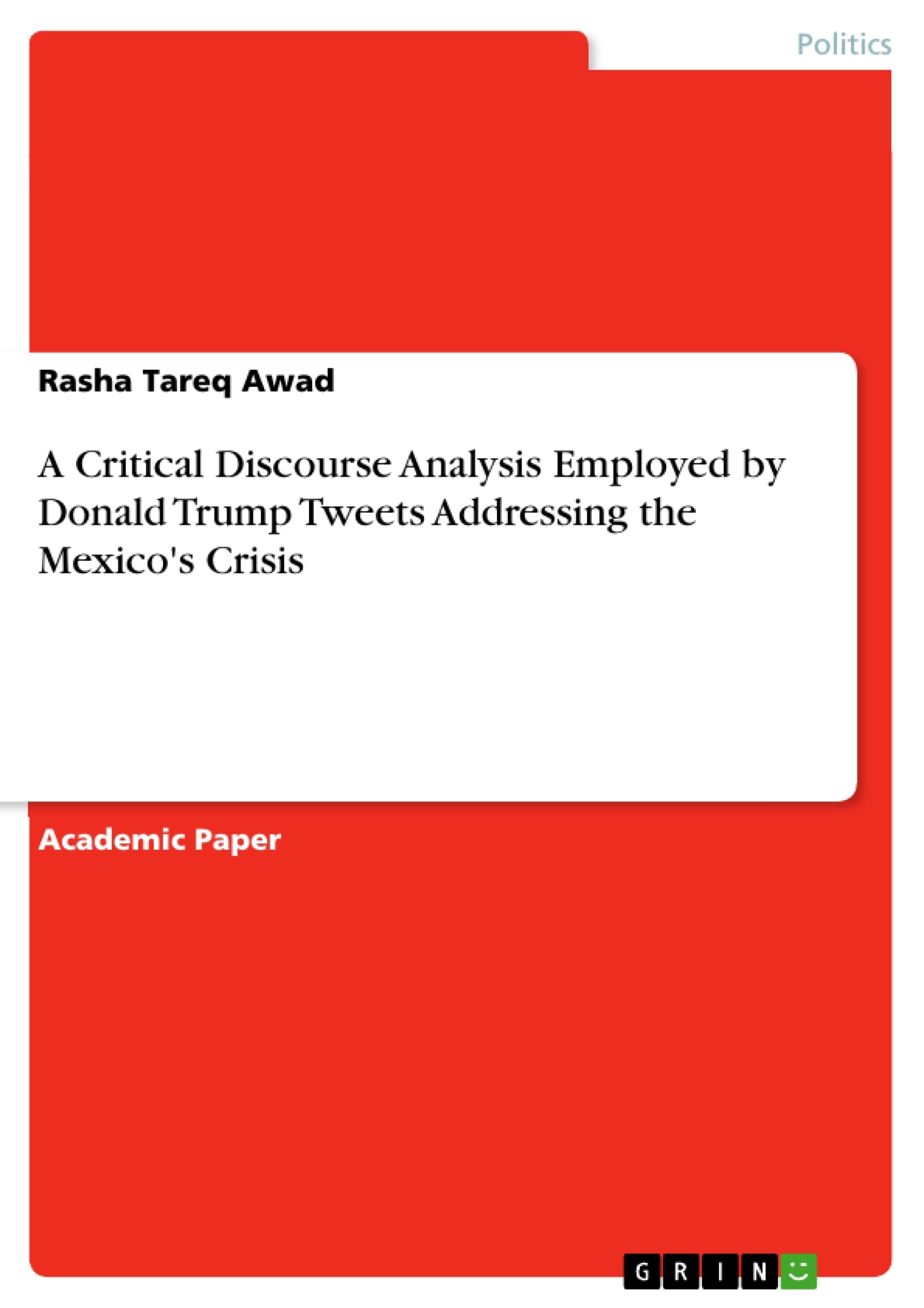This current study investigate the ethnicity of the tweets written by Donald Trump on his official Twitter account concerning the Mexico crisis. The aims of this paper to investigate the ethnicity of Donald Trump Tweets addressing the Mexico crisis . The descriptive qualitative design utilized to analyse the data . The 50 tweets selected in this study analyses in terms of the ideology by utilising the evaluation form designed based on the conceptual framework of Critical Discourse Analysis theory Van Dijk’s . The duration of collecting the data from 4th February 2017 until 20th July 2019. Meanwhile , the theory utilized is Teun A. van Dijk’s critical discourse analysis . The data of the study takes from Donald Trump official account realdonaldtrump@. The results of the study demonstrate that the ideology of attacking Middle East countries and Islam has inflicted a lot of interests from many parties as this issue is considered sensitive and always been a target of racism among Americans.
Inhaltsverzeichnis (Table of Contents)
- Introduction
- ethnicity
- Critical Discourse Analysis
- Method
- Results
- Discussion
- Conclusion
- References
Zielsetzung und Themenschwerpunkte (Objectives and Key Themes)
This study examines the ethnicity of tweets written by Donald Trump on his official Twitter account concerning the Mexico crisis. The primary objective is to analyze the tweets through the lens of Critical Discourse Analysis (CDA) to understand the underlying ideology and the way Trump's language constructs the “other” within the context of the Mexico crisis.
- The role of language in constructing identity and otherness
- The use of Twitter as a platform for political communication and discourse
- The influence of ideology on political discourse and the portrayal of immigrants
- The application of CDA to analyze political rhetoric and its impact on public perception
- The examination of Trump's tweets concerning the Mexico crisis in relation to broader themes of racism and xenophobia
Zusammenfassung der Kapitel (Chapter Summaries)
- Introduction: This chapter provides background information on the rise of social media as a platform for communication and its potential for both positive and negative uses. The focus is on Twitter as a platform for expressing opinions and the potential for harmful discourse, particularly in the context of political communication.
- ethnicity: This chapter introduces the concept of ethnicity and its significance in understanding the motivations behind Trump's tweets. It explores the role of ideology in shaping group beliefs and practices, with particular emphasis on the use of language to distinguish “us” from “them.”
- Critical Discourse Analysis: This chapter delves into the theoretical framework of CDA, specifically drawing on the work of Teun A. van Dijk. It explores how CDA can be employed to uncover the underlying ideological messages embedded in texts and the ways in which language can be used to manipulate and control audiences.
- Method: This chapter outlines the methodology used in the study, including the data collection process (selecting and analyzing 50 tweets) and the specific analytical techniques employed. It also explains how the study draws on Van Dijk's conceptual framework to analyze the tweets.
- Results: This chapter presents the findings of the study, analyzing the content of the tweets and identifying the key themes, strategies, and linguistic features employed by Trump. The focus is on how Trump's language constructs the "other" and perpetuates negative stereotypes.
Schlüsselwörter (Keywords)
This study explores the intersection of Critical Discourse Analysis (CDA), Twitter, political rhetoric, Donald Trump, ethnicity, and the Mexico crisis. It utilizes Teun A. van Dijk's theoretical framework to examine how language constructs ideologies and perpetuates negative stereotypes, particularly in relation to issues of immigration and racialized others.
- Quote paper
- Rasha Tareq Awad (Author), 2021, A Critical Discourse Analysis Employed by Donald Trump Tweets Addressing the Mexico's Crisis, Munich, GRIN Verlag, https://www.grin.com/document/998190




